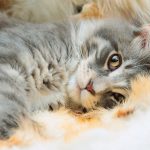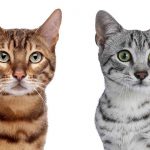Flat faced cats are widely admired for their squashed features. Their muzzle is short, nostrils are narrowed and the bridge of their nose often has … [Read more...]
Maine Coon Tabby Cat: Secrets Of An Amazing Striped Giant
Most Maine Coons have stripes in their fur. So the chances are, if you’ve been lucky enough to meet one of these feline giants, it was a Maine Coon … [Read more...]
Why Are Maine Coons So Big?
Why are Maine Coon cats so big? Is it related to survival before they were fully domesticated, or have breeders engineered their size because they … [Read more...]
Maine Coon Cat Names
Incredible cats deserve fabulous names. The Maine Coon cat is not only one of the largest of all the purebred cat breeds, but also one of the most … [Read more...]
British Shorthair: Weight, Traits And Care
The British Shorthair is both one of Britain’s oldest and most enduringly popular cat breeds. This cat is often described as teddy bear like, and this … [Read more...]
Ragdoll Cat Care, Traits And Breed Guide
Your Ragdoll cat has an affectionate, docile and sweet-natured temperament. And it's no surprise, given the name Ragdoll cat is derived from their … [Read more...]
38 Fantastic Tuxedo Cat Facts
The tuxedo cat is not a breed, but instead a description of a pattern. Tuxedo cats are mostly black with a white patch on their chests that looks like … [Read more...]
How To Identify A Ragdoll Cat
Ragdoll cats are highly sought after thanks to their sweet and affectionate personalities. They’re also extremely pretty to look at. And since they … [Read more...]
Maine Coon vs Norwegian Forest Cat
Many people are hard pressed to distinguish between a Maine Coon vs Norwegian Forest cat. But there are some key differences. A Maine Coon’s face is … [Read more...]
Egyptian Mau Vs Bengal Cats
The Egyptian Mau vs Bengal: the cat battle is on! Are you on the hunt for a wildcat? On the one hand, we have the elegant and sleek Egyptian Mau. On … [Read more...]
- 1
- 2
- 3
- …
- 8
- Next Page »









